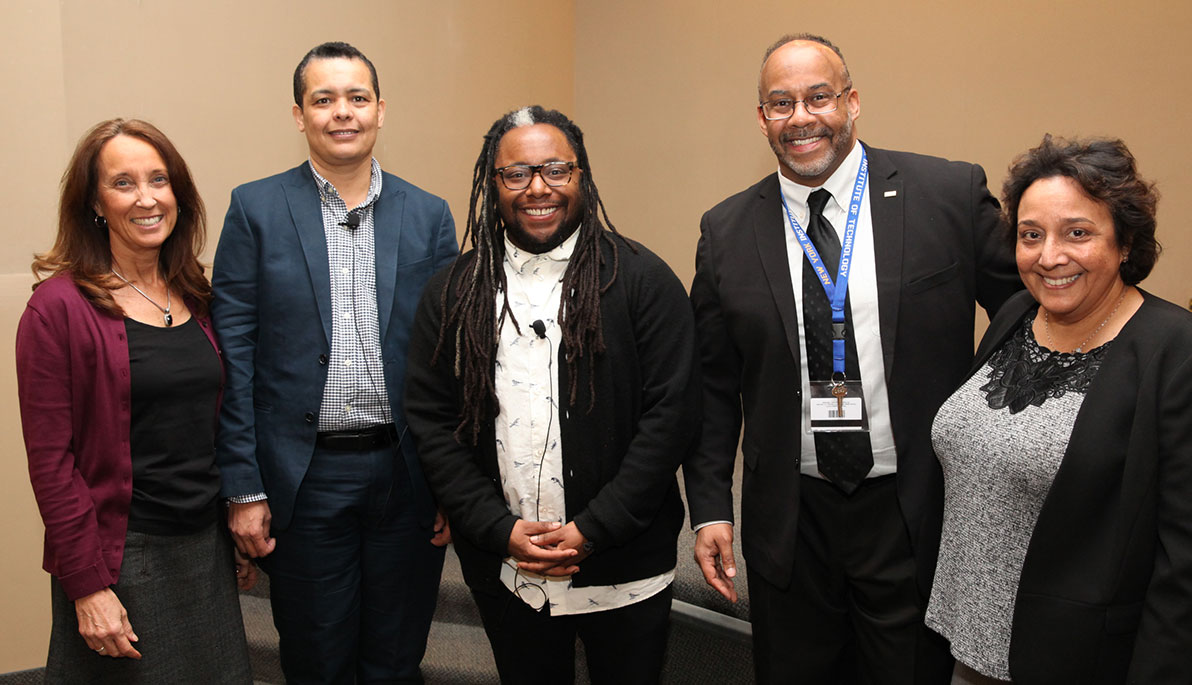News
Helping Health Providers Care for Transgender Patients
March 6, 2017
Photo: From left, Rosemary Gallagher, assistant professor of Physical Therapy; Asa Radix, M.D.; D’Hana Perry; Dean Sheldon D. Fields, Ph.D.; and Zehra Ahmed, assistant professor and chair of Physician Assistant Studies.
People who are transgender and gender nonconforming (TGNC) may face a host of issues in their daily lives. One of those is finding informed healthcare providers. At Conversations in Transgender Health, NYIT students learned about transgender healthcare policy and how, in their professional capacity, they can provide better care to TGNC patients. The event, held as part of the NYIT School of Health Professions Dean’s Speaker Series, featured D’hana Perry, public health researcher, case manager, and video artist, and Asa Radix, M.D., director of research at The Callen Lorde Community Health Center and assistant clinical professor of medicine at New York University.
“The topic of transgender health is no longer taboo or an uncommon one,” said Sheldon D. Fields, Ph.D., dean of the School of Health Professions. “As a cutting edge institution, preparing myriad students for roles as future healthcare providers we must be in the business of bringing topics and high quality speakers such as this to enrich the entire NYIT community.”
While most schools do not currently offer classes that specifically focus on transgender health, speaker events and learning sessions help prepare health professions’ students to treat all patients and enhance their educational experience. “As our society continues to change and evolve, the issue of how to care for the transgender community who is seeking healthcare services is an important one for all healthcare students to have some understanding of,” Fields said.
At the event, Perry explained that transgender healthcare and policy can be complex and when treating a trans individual, providers should keep in mind a number of different factors and nuances. For example, it is important to have an understanding of transgender terminology because it changes and is likely to vary from patient to patient. Being well-versed in New York State Human Rights Laws and what various insurance companies cover is also key. There is even specific language students should familiarize themselves with when it comes to insurance policies. “You need to know what discrimination looks like in insurance,” Perry advised.
When it comes to treatment, students must also have a solid understanding of the medical concerns that may arise with a patient who is TGNC.“Because of the discrimination they face, TGNC people often will not go to the doctor. They avoid preventive and urgent care,” Perry said.
Once a patient is in the provider’s office, it is important to ask specific questions with their background in mind. “Ask questions about their medical history, their transgender journey, and what specifically they are doing if they are changing their appearance—for example, if they are binding (flattening their breasts) or tucking. Ask if they are using hormones and where they are getting them from. Ask about their sexual history and psychological issues,” Radix said. “You need to ask these questions because you need to be able to advise people.” If someone is transitioning from female to male, they will still need a mammogram or if they are transitioning from male to female, they will still need to have their prostate checked. These are things a healthcare provider will need to keep in mind when treating a transgender patient.
Both Perry and Radix emphasized that learning about TGNC needs, understanding how to be accessible, and being respectful is essential.“Often times it is a lack of exposure to special topics in healthcare such as this one that makes the difference in a student choosing to specialize in the care of certain underserved or marginalized patient populations,” said Fields. “I hope we sparked an interest in the students to learn more. As they go out and begin to take care of patients, they will be more effective and not inadvertently do any harm.”





